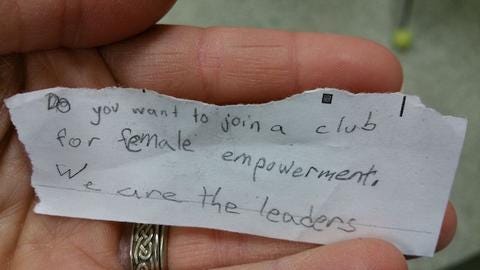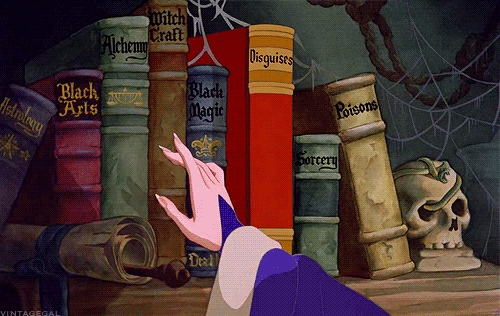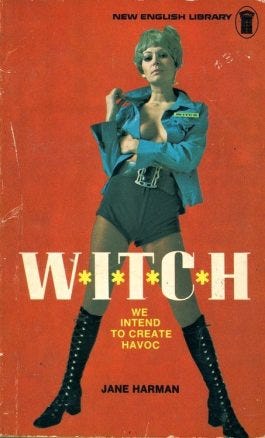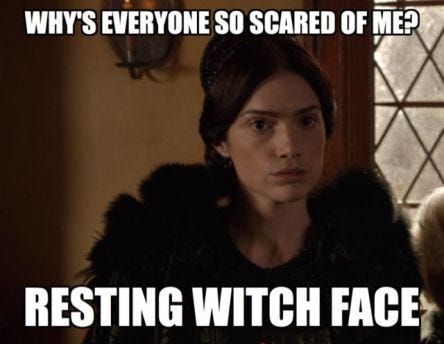(This post was first published on my blog “The Witching Hour” January 14, 2020. That Wordpress blog is no longer accessible so I will be migrating a few select pieces from that blog here over the next few weeks.)
My coven has a little framed bit of calligraphy hanging by the entrance door to our temple, hung there back in the 1970s I believe, that says “The Lyf so short, the Craft so long to lerne.” It’s Hippocrates by way of Chaucer, but of course it applies beautifully to witchcraft. I found myself thinking about this all week after this article came out, wherein a journalist claims she spent a week learning witchcraft and then made a whole bunch of insulting claims and assumptions about it. I took to Twitter and posted a long rant and this was the result, so I gathered those tweets together (with a few comments added here and there for clarity) to share here.
I just spoke with a filmmaker (from Paris) who’s making a documentary on witches. I mentioned a witch I saw on Twitter who recently admitted to having a crisis of faith, that she didn’t really “believe” in witchcraft anymore, that she deleted all her tweets and no longer wanted to be known as a witchcraft influencer, and it’s been haunting me.
The current explosion of witchcraft on social media paints a rather misleading picture of the depth, complexity and knowledge underpinning a spiritual movement that’s been reinventing itself since the 1960s.
Witchy imagery on Instagram is wonderful; as are encouraging articles about self-care that encourage exploration of herbs, tarot, crystals, meditation and/or spell-work as modes of engagement with identity and self-transformation. BUT there are real problems in media coverage.
Partly the issue is one that’s always plagued journalistic coverage of the witchcraft movement: what intrigues people most (practitioners included!) is often the dark, mysterious, fantastical, forbidden, occult aspects; so, amid the effervescent chatter about empowerment and healing and feminism and intersectionality and secular integrity etc. there is also the problem that witches have always been characterized as Other; and many witches still wish to be identified in this way.
And there’s nothing wrong with that: outsiders and rebels and outlaws are figures that can inspire us with their courage and confidence. But the notion of persecution is the flip-side of this, and it’s a tricky one.
On the one hand, yes, women are still oppressed in many ways. Certainly we’re seeing sexism flourish these days in ways it hasn’t for decades and I think we can all point to some pretty obvious reasons why. Also, that’s not to exclude my brother witches from the movement: but the current zeitgeist has seized upon witchcraft as a feminine mode of expression, and, many of us are hoping, one that may yet allow us to smash the patriarchy once and for all. And maybe take our stewardship of this planet we call home more seriously, before it’s too late. For witches and pagans have generally failed as torch bearers for the environmental movement (more on that another time perhaps)
What I see as the most vexing aspect of the current movement is its general lack of seriousness, and almost utter failure to consider its own rather fascinating history. The seekers and renegades who embraced witchcraft and paganism in the 1950s and 1960s relied largely upon BOOKS to learn about things like folklore, archaeology, comparative religion, the occult and any number of other topics from herbal healing to tarot to sex magic to ecology.
With the rise of the internet in the 1990s, came access to vast stores of knowledge, but also a decline in book reading (even as pagan publishers like Llewellyn leapt at the chance to publish tons of new titles aimed at attracting newcomers to paganism and witchcraft). and a move towards short-cut modes of learning. The witches and pagans I’ve met over the years who’ve been doing this a while are, without exception, extremely well-read. (They’ve also seen THE WICKER MAN at least a dozen times but that’s another thread)
But in the mad rush to BE A WITCH and, perhaps in the process, build one’s social media following, we’re seeing an awful lot of shallow posturing and soup-of-the-day sorts of trends that have no connection what witchcraft is or what it means to its millions of practitioners.
Remember when those grunge bands got popular in the 1990s (forgive me this Gen X woolgathering) and those scrappy kids wore lots of flannel shirts and wool hats, cuz it was cold where they lived, and then that mode of dress became a FASHION MOVEMENT? Yeah, it’s like that. People glommed onto the look and vibe without really understanding it was wholly unintentional, and that look came to also define the music and its underlying intentions, somehow.
By watering down witchcraft, by reducing it to its sparkly trappings or its most basic Hollywood-inspired stereotypes, we fail to acknowledge what all these articles and influencers are (perhaps inadvertently) trying to tell us: that witchcraft is actually A FORCE FOR CHANGE. But we can’t necessarily see past all the feel-good visuals and clever memes to pick up on why this obsessions is happening here and now.
Of course, many people realize it’s a response to misogyny and fascism and environmental degradation (as it was in 1968 when W.I.T.C.H. came on the scene), at least in part, but plenty of people don’t make these connections. And many of the people who are expressing witchcraft as an identity, alas, also don’t offer much depth or context to what they’re doing. The shallow frippery promulgated by the very people claiming or aspiring to be at the forefront of this movement reduces this rich, life-affirming, culturally-evocative, potentially game-changing movement to trendy baubles of clickbait, and makes witches YET AGAIN the subject of widespread mockery, ridicule, disrespect and, yes, probably persecution.
I mean.
Here’s an example of what all your witchy hashtags (and, oh dear goddess, my own as well) have wrought: I Spent a Week Becoming a Witch and the Results were Worrying.
Among other things, one conclusion drawn by this journalist who spent a WHOLE WEEK “becoming a witch” (a spiritual undertaking that takes most people months if not years) was this: “however benign or even beneficial the rituals, it’s all built on a wobbling base of bats***.”
Batshit. She called it batshit. As in, “batshit crazy.”
Now, I don’t dispute this journalist did some research to prepare this article. Heck, she even throws in some context here and there. But her foregone conclusion does indeed seem to be that witchcraft, because trendy, must automatically be nonsense. And you know, fair enough. I get it. It’s weird to call yourself a witch. It’s weird to try and use magic or divination to effect change in your life. But millions, heck, billions, of people use prayer or art or manipulation or the mechanics of capitalism to try and do that, too, and, well, here we are.
What I said earlier about persecution? Today’s witches may not be facing the stake or the gallows or the dunking stool (though in parts of Africa accused witches are still sometimes tortured). But the sort of media-informed privilege that allows us to proclaim ourselves witches or pagans or druids or heathens or what have you is, strangely enough, not the sort of privilege that protects us from the ridicule that is dished out by the likes of Ceri Radford or David Brooks or any number of cynical, willfully under-informed journalists who are more than happy to spin stories that makes us look like insipid fools, or delusional cultists.
Radford’s choice of a recent book by a virtually unknown author (The Modern Witch’s Guide to Happiness: Self-Care Rituals, Mystic Guidance and Magick Spells to Harness Your Power by Luna Bailey), as opposed to a book that had years of proven popularity among contemporary witches (like The Spiral Dance by Starhawk, or What Witches Do by Janet and Stewart Farrar, or even Wicca: A Guide for the Solitary Practitioner by Scott Cunningham), shows she was not actually interested in learning anything solid or significant about the witchcraft movement, or serious about learning anything about actual witchcraft practice. For all I know, Bailey’s book is perfectly fine. But given how many books exist on this subject, it’s telling that Radford chose a brand new one whose title echoes the current social media zeitgeist so explicitly.
It’s déja vu all over again. The current crop of books aimed at newly-converted witches is remarkably similar to the explosion of pagan books in the 1980s and 1990s, with a handful of publishers printing books madly to keep up with the demand. Some of them were very good books. Many were derivative drivel, or poorly-written claptrap. The same can be said of the current situation.
The difference is: in those days, if the contemporary books were lacking, we turned to older ones to make up for it. The Golden Bough. The White Goddess. Yeats, Keats, Blavatsky. Sybil Leek. Leo Martello. Dion Fortune. Aubrey Burl. Merlin Stone. Gerald Gardner. Patricia Crowther. We turned to the poets, to the scholars, the archeologists, the feminists, the occultists, heck, anyone who seemed to have some insight. We took notes, we had discussions, we shared books, we created zines, we devoured everything we could in the quest for knowledge.
Then, the internet happened, and with it, witchcraft lost some its secrecy, and perhaps, some of its mystery. Having the movement and the community out in the open had pros and cons, of course. Hello, Satanic Panic! But overall, growing familiarity was a good thing. Except the same technology that allowed for ease of networking so important for solitaries who lived in remote regions) and sharing of information also led, eventually, and unfortunately, to a pall of laziness. After seeing so much dynamic energy and creativity and passion in the pagan community from my years working with The Witches’ Voice (founded in 1997), the new apathy was depressing, even though it took a few years to get there.
At first, being able to order books at the click of a mouse was amazing; magical even! But, then more and more websites began to appear, and multiply, and resources popped up everywhere, like wildflower seeds, or religious tracts, or porn (choose your metaphor). The pagan-curious stopped turning to books or even study as a method to learn witchcraft.
Why, when one could learn spells from a colorful website, would someone put the effort into reading a book? Why spend time memorizing correspondences when you could enter a chatroom with a bunch of other witches and argue about the right or wrong way to do things? (Yes, the internet also brought us a new and exciting way to engage in Witch Wars.) Why go to the trouble and spend the time to become knowledgeable when it was possible to simply declare yourself a powerful witch or warlock, or someone descended from occult royalty, or a reincarnation of, I dunno, Isobel Gowdie or Merlin or Morgan le Fay or Marie Laveau? I mean, why bother?
And now we find that contemporary witchcraft, as it is now understood via social media’s portrayals, is little more than a hobby, barely even a craft anymore. Witchcraft is a mode of expression. It’s an aesthetic. It’s fashion. It’s political. It’s self care. It’s activism.
Witchcraft is taking photos of our cool-looking altars (or the sparkly sarongs we’re packing to bring to Burning Man, or the tarot card we just laid down next to our morning coffee), and posting them on our timelines.
Witchcraft, that most spectacular of spiritual pursuits, has become mere spectacle, devoid of ritual, devoid of magic, devoid of spiritual intent.
And while I don’t think there’s anything inherently wrong with adopting some of witchcraft’s imagery or tropes to try and enhance whatever you’re doing, those things you’re doing, well, they’re not witchcraft. Sorry, but no.
They’re still worthy activities! Activism and self care and empowerment and fighting for justice and equality and smashing the patriarchy, yes, they’re all tangential to witchcraft. But they’re not, in and of themselves, witchcraft.
And that’s a thing we need to talk about. And I think we will indeed be talking about this much more in the days and weeks to come. Thanks for reading. More anon.











